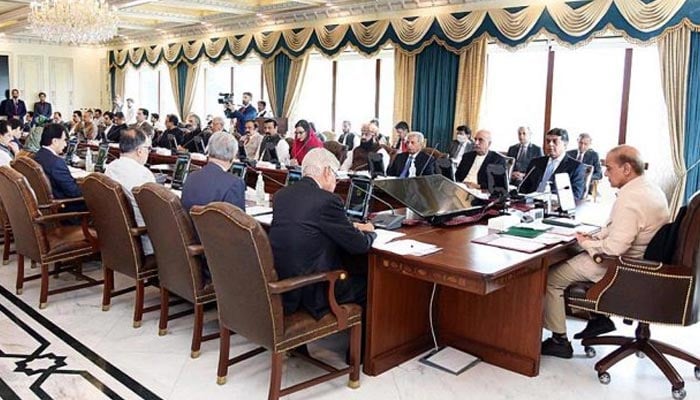Cabinet committee to review bill proposing curbs on criticism against institutions
Bill creates sharp division in the federal cabinet with ministers from PPP, PML-N opposing it
February 08, 2023

- Bill proposes five-year jail term along with Rs1m fine, arrest without warrant.
- Rana Sanaullah, Azam Nazeer Tarar, Sardar Ayaz Sadiq, two others part of committee.
- Saad Rafique says such legislation had proved counterproductive in past.
ISLAMABAD: Prime Minister Shehbaz Sharif has constituted a cabinet committee to review the bill that is aimed to amend the Pakistan Penal Code (PPC) and the Code of Criminal Procedure (CrPC) after it created a sharp division in the federal cabinet, The News reported Wednesday.
The controversial bill — Criminal Laws Amendment Bill, 2023 — provides for curbs on criticism of certain state institutions including the judiciary and the army through arrest without warrant and imprisonment of five years along with fines of up to Rs1 million.
PM Shehbaz, who was chairing the cabinet meeting, formed a committee of ministers to review the legislation to make it acceptable.
Interior Minister Rana Sanaullah, Law Minister Azam Nazeer Tarar, Economic Affairs Minister Sardar Ayaz Sadiq and two others from the allied parties have been included in the committee.
Federal ministers belonging to Pakistan Muslim League-Nawaz (PML-N) Khawaja Saad Rafique, Mian Javed Latif, Ahsan Iqbal and Dr Musadik Malik and Pakistan Peoples Party's (PPP) Sherry Rehman, Syed Naveed Qamar and Hina Rabbani Khar were among the cabinet members who opposed the bill in its present shape.
Well-placed cabinet sources told The News that Rafique opposed the bill contending that such legislation had proved counterproductive in the past. The bill provides up to five-year imprisonment to whoever ridicules the Pakistan Army and judiciary through any medium.
The cabinet summary states that recently the country has witnessed a spate of scandalous, derogatory and vicious attacks on certain institutions of the state, including the judiciary and armed forces. It is well-known that a deliberate cyber campaign has been launched by certain wings for self-serving motives with the objective of inciting and nurturing hatred against important state institutions and their officials. Such attacks are focused on undermining the integrity, stability and independence of the country’s state institutions.
The summary explained that judicial and army officials do not have the opportunity to step forward and negate scandalous, derogatory remarks while appearing in the media.
The document suggests that given the long-tested legal principle noted in Section 196 of the CrPC, prior approval of the federal government before taking cognisance of the case or registration of a first information report (FIR) against any person has been made mandatory to avoid misuse of the mooted PPC section.











